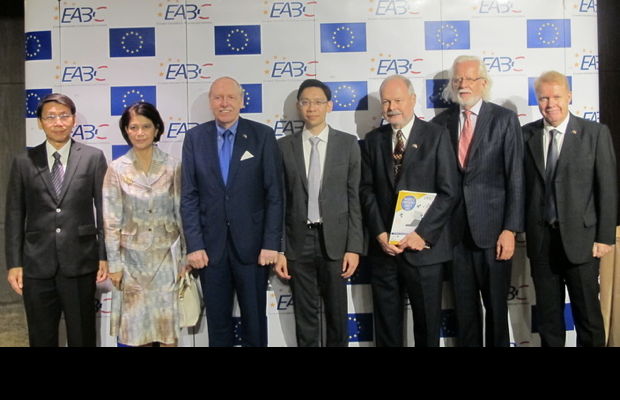The European Association for Business and Commerce (EABC) on 25 September 2015 hosted the launch event for its Business Confidence Survey 2015. The main objective of this Survey is to explore the European business confidence in the Thai economy as well as to investigate their view on current trade-and-investment-related issues, especially the issues of EU – Thailand FTA and the GSP cancellation. The result shows that the European business community is still optimistic and confidence in Thailand while EU – Thailand FTA renegotiation is necessary and will be more effective with the complement of regulatory reforms that accommodate favourable trade and investment climate.

Mr Rolf-Dieter Daniel, President of EABC, presented the result of the survey, which shows the optimistic perspective of European business community toward Thailand’s economy; believing that the economy will improve in the next two years. Similarly, the respondent companies also trusted that their business performance should improve along with the economic trend, with the main driver of an increase in customer base and market demand. However, the concern is posted on government plans or regulators that may hamper ease of doing business in the country; thus, affect decisions for foreign investment expansion.
The Survey is conducted by the EABC (a European Trade Organization), in collaboration with a Consortium of 16 European Chambers of Commerce and Associations in Thailand and Europe. It consists of 26 questions, with 5 categories. In total the survey had 127 respondents. It not only keeps the statistic record of European companies operated in Thailand, but also explore their view on current trade and investment topics, which may be at their interest, such as the impact of GSP cancellation and the potential renegotiation of EU –Thailand Free Trade Agreement (FTA). A significant concern was shown from the result of the Survey on the impact of the GSP loss on the export performance, particular in the manufacturing sector. Despite the concern, only few companies have already taken a business plan to adapt to this change.
The Survey also asked about the business perspective on the renegotiation of EU – Thailand FTA. The result indicated that although the renegotiation of FTA is important and necessary, regulatory reforms that will bring favourable trade and investment climate is a must as a complementary element to upgrade doing business in Thailand; thus, strengthen the country towards competitive economy. To maintain their profitability, the businesses plan to enhance their customer base and sale activities in Thailand, rather than expanding market in the region. The most concerned threat for the business is the political uncertainty. All in all, with the dynamics of business and regulatory implementation in Thailand, the European business community agreed that support from chambers of commerce and other trade organization in terms of business facilitation is crucial, particularly in the area of policy dialogue and advocacy.
For further fruitful discussion, the EABC also invited Dr. Phacharaphot Nuntramas, the Head of Economic and Financial Market Research, Economic Intelligence Center, Siam Commercial Bank, as a keynote speaker to share his view on “Investment Direction Towards 2015 and Beyond for European Business Community in Thailand and ASEAN”.
“Although the global economy is expected to recover, the regional economy, Asia and Thailand, would recover at a slower rate, primarily due to China’s economic slowdown,” said Dr. Phacharaphot.
He discussed four key determinants for the Thai economy: export concern, potential decline in consumption, infrastructure/ megaproject investment, and strong tourism growth. The most efficient business strategy is to find the new investment themes that suits a country’s capacity best; for example, innovative and services industries such as ICT, healthcare and pharmaceuticals, financial services for US and EU businesses, and consumer discretionary sector for Asia business.
Under the light of ASEAN Economic Community (AEC) implementation, businesses in Thailand must adapt an ASEAN strategy to maintain their competitiveness. Moreover, it is very important to take an advantage of various investment promotion schemes that the Thai Government is now offering to the private sector, which include interesting sectors for European Business Community such as medical services, digital, automotive, and petrochemicals, said Dr. Phacharaphot.
During the Q&As session, Dr. Phacharaphot also emphasized the role of services liberalization in strengthening Thailand toward more competitive economy in the global market.
Two Swedes attended the survey launch: EABC Board member Jan Eriksson and EABC Executive Director Peter Björk.
